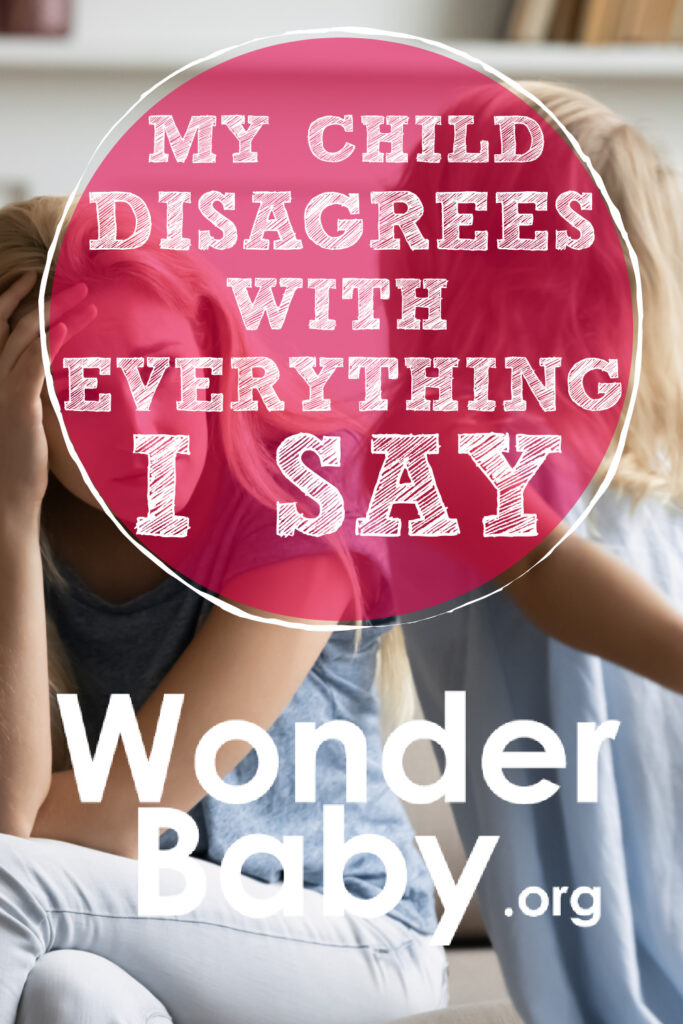My Child Disagrees With Everything I Say! (6 Tips)

- Arguments and power struggles can be a normal part of growing up.
- Taking the time to regulate yourself and helping your child feel heard can prevent an argument and increase connection.
- Let your child establish control over their world in small ways.
- Acknowledging and honoring your child’s feelings can help prevent future arguments.
“Fine! Whatever! I don’t care!”
At different points in my children’s lives, it was a toss-up of who was uttering those words—them or me.
Do you ever feel like your children are arguing with you just to argue? Toddlers are notorious for this behavior, as are adolescents of all ages. Any conversation with parents of children in these (and other) age groups will likely include discussing techniques and best practices for managing argumentative kids.
Feeling overwhelmed by the many arguments in your house? Learn how to set boundaries, remain calm, and restore peace in your household through these six tips.
Why Does My Child Argue?

Have you ever asked yourself this question during an intense conversation with an argumentative child?
From a child’s point of view, in the developmental quest for autonomy11. Mcleod, S.. Erik Erikson’s Stages Of Psychosocial Development. Simply Psychology. 2024. https://www.simplypsychology.org/erik-erikson.html (the right and ability to make decisions for oneself), everything is worth fighting for. Children accomplishing this task are testing limits, forming their own opinions, and establishing themselves as separate entities from their parents.
However, for their exhausted adults, a child’s arguing can feel like attention-seeking behavior or even be misinterpreted as wrong or bad behavior.
How Can I Stop Disagreeing With My Child?
Often, disagreements with an argumentative child can be managed by using any combination of the following tips:
1. Pick Your Battles

Do you ever feel like you’re fighting a war you can’t win against your child?
When you’re in the throes of parenting an argumentative child, even the simplest decision can become a power struggle. Some kids tend to have more definite opinions than others, turning daily events like feeding, dressing, and sleeping into major battles.
If you find yourself constantly arguing with your child, it may help to stop and consider if the battle is worth the engagement.
When my children were small, I used this basic rule to help myself decide which battles I wanted to enter: Issues surrounding safety matters (like bike helmets or seat belts) were non-negotiable. Everything else could at least be discussed.
2. Refuse to Fight

Many parents of kids with strong personalities feel compelled to engage in power struggles with their children to establish familial leadership or enforce healthy boundaries.
As the adage goes, “It takes two to tango.”
Restated, your child can’t have the last word and argue it out if you or other family members don’t show up emotionally to the argument. An effective way to stop arguing is to simply refuse to fight or have the last word.
3. Set Clear Boundaries and Expectations

As kids grow, their adults need to set—and maintain—clear standards for respectfully interacting and talking with each other. Enforcing these standards most of the time (if not every single time) allows kids to internalize social rules and know what’s expected of them.
For example, imagine that you and your child switched places. Understandably, you’re feeling overwhelmed and frustrated by the experience. In a burst of anger, you begin to argue with your sibling and whack them with a toy. Instead of the expected time out and forced apology, you’re rewarded with a cookie and snuggles.
Who wouldn’t be confused?
Adult life is full of contradictions, but according to staff from the Child Mind Institute22. Complete Guide to Managing Behavior Problems. Child Mind Institute. 2023. https://childmind.org/guide/parents-guide-to-problem-behavior, boundaries and rules shouldn’t be one of them.
4. Use Positive Reinforcement

A 2012 study33. Law, B. M., Siu, A. M., & Shek, D. T.. Recognition for Positive Behavior as a Critical Youth Development Construct: Conceptual Bases and Implications on Youth Service Development. The Scientific World Journal. 2012;2012, 1–7. https://doi.org/10.1100/2012/809578 described the emotional components of a parent-child relationship (such as parental warmth, involvement, and support) as having a direct, positive effect on the child’s likelihood to follow and respond to behavioral messages sent by the parent.
The study states, “Recognition for positive behavior in the form of parental warmth as social reinforcement is crucial for the development of further positive behavior.”
Positive reinforcement doesn’t have to be extravagant to be effective.
A simple “Thank you for using your words” or “I appreciate it when you speak calmly instead of shouting” coupled with a smile or hug and kiss can go a long way in diffusing tension between you and your child and helps to restore a loving connection.
5. Stay Calm and Present

Parents are their children’s first teachers when learning social skills, including listening well and problem-solving techniques. Children learn—and will mimic—the behavior patterns demonstrated by the adults around them.
If your goal is for your child to respond to conflict in a calm and engaged way, the best solution is to serve as a good role model and demonstrate that practice yourself.
Most adults have a hard time remembering the bigger picture of teaching emotional regulation when feeling upset or triggered.
Child Mind Institute44. Arky, B.. Calm Voices, Calmer Kids. Child Mind Institute. 2023. https://childmind.org/article/calm-voices-calmer-kids recommends these tips to stay calm and present when your child argues with you:
- Mentally pause when your child starts to wind up, and take a deep breath or count to 10.
- Ask your child to pause and tell them you need a short break to listen well. You can physically leave the room (if it’s safe to do so) or simply close your eyes to signal that you’re unavailable.
In my personal experience as a mother and a nurse, I also use the following tools to stay centered and grounded in my intent to role model healthy conflict behavior for those around me:
- Accept that you and your child can have different beliefs. Remember that your child is entitled to their own opinion—even if you think that opinion is wrong.
- Invest in a stock phrase that enforces clear, firm boundaries and reinforces house rules to signal to your child when they’ve crossed a line. Phrases such as “Ouch! We use our words, not our hands” tend to work well for younger children, while adolescents might get a loving and firm “I remember that differently” or “I can’t hear when you speak to me that way.”
- Remind yourself that “all behavior is a form of communication.55. Behavior is Communication. Michigan Alliance for Families. https://www.michiganallianceforfamilies.org/behavior-is-communication/#:~:text=All%20behavior%20is%20a%20form,are%20not%20aware%20of%20it. ” Kids act out physically what they feel internally, even if they can’t articulate the emotion. Try tuning in to your detective instincts and seek to decode what your child’s behavior suggests about how your child feels to diffuse arguments.
- Remember that kids have stress too. Many kids start arguing as a form of emotional release after managing emotions all day at school, processing situations with friends, or because of difficulties with other kids. Make space for rest or a snack before engaging with your child on tough topics.
- Know when to walk away. If your child argues to the point where you feel yourself losing physical or emotional control, make sure other adults are nearby to care for your child (or children) and step away from the situation to cool down.
When adults can stay calm and present when their child argues or during a heated conversation, it signals to children that they are emotionally safe to share their opinions and strong personalities without fear of punishment or shame.
6. Provide Choices and Compromises

In the heat of an argument, many adults and children become fixated on their point of view and lose the ability to problem-solve certain aspects of the situation.
Enter the art of negotiation, compromise, and structured choices.
Compromise allows both parties—in this case, parent and child—to show flexibility, empathy, and grace, which is necessary in many different life situations. It allows children to have a sense of control over themselves and their choices and is particularly helpful for kids who have a hard time accepting a decision they can’t directly control.
Note: The key to an effective compromise for a parent is that each solution is acceptable and accomplishes what needs to be done. For example, instead of saying, “Turn that game off right now, or you’ll lose screens for a week!” try something like, “I can see you’re frustrated that you need to stop playing your game. Would you like me to set the timer to remind you to turn the game off in five minutes, or would you rather I come back in five minutes and turn it off?”
Raising a child with a strong personality can be emotionally challenging for many parents. If you feel as though everything you say seems to be an invitation for your child to argue you, remember that each time your child initiates an argument is an opportunity to decide whether or not you will engage. By maintaining healthy boundaries and remaining calm, you lead by example in teaching your child how to respond positively to conflict.
References
- Mcleod, S. (2024, January 25). Erik Erikson’s Stages Of Psychosocial Development. Simply Psychology. https://www.simplypsychology.org/erik-erikson.html
- Complete Guide to Managing Behavior Problems. Child Mind Institute. (2023, August 3). https://childmind.org/guide/parents-guide-to-problem-behavior
- Law, B. M., Siu, A. M., & Shek, D. T. (2012). Recognition for Positive Behavior as a Critical Youth Development Construct: Conceptual Bases and Implications on Youth Service Development. The Scientific World Journal, 2012, 1–7. https://doi.org/10.1100/2012/809578
- Arky, B. (2023, October 30). Calm Voices, Calmer Kids. Child Mind Institute. https://childmind.org/article/calm-voices-calmer-kids
- Behavior is Communication. Michigan Alliance for Families. (n.d.). https://www.michiganallianceforfamilies.org/behavior-is-communication/#:~:text=All%20behavior%20is%20a%20form,are%20not%20aware%20of%20it.

The information WonderBaby provides is not intended to be, and does not constitute, medical or other health advice or diagnosis and should not be used as such. Always consult with a qualified medical professional about your specific circumstances.
Related Posts

Behavior
Understanding Intermittent Explosive Disorder in Children
Are you worried about your child’s unexpected aggression and explosive behaviors? Learn how to support a child with intermittent explosive disorder.

Behavior
5 Emotional Regulation Activities for Kids
Want to teach your child how to regulate emotions? Here are emotional regulation activities for kids that can help!

Behavior, Special Needs
5 Tips for Dining Out with Children Who Have Sensory Sensitivities
Worried about dining out with sensory sensitivities? Try these tips for less stress and more fun the next time you take your family out to eat.